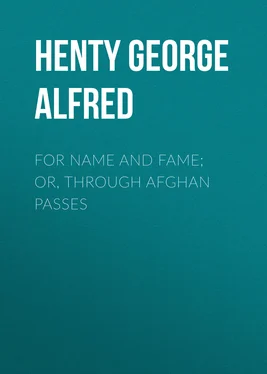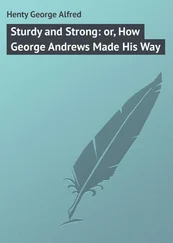George Henty - For Name and Fame; Or, Through Afghan Passes
Здесь есть возможность читать онлайн «George Henty - For Name and Fame; Or, Through Afghan Passes» — ознакомительный отрывок электронной книги совершенно бесплатно, а после прочтения отрывка купить полную версию. В некоторых случаях можно слушать аудио, скачать через торрент в формате fb2 и присутствует краткое содержание. Жанр: foreign_children, foreign_antique, foreign_prose, на английском языке. Описание произведения, (предисловие) а так же отзывы посетителей доступны на портале библиотеки ЛибКат.
- Название:For Name and Fame; Or, Through Afghan Passes
- Автор:
- Жанр:
- Год:неизвестен
- ISBN:нет данных
- Рейтинг книги:3 / 5. Голосов: 1
-
Избранное:Добавить в избранное
- Отзывы:
-
Ваша оценка:
- 60
- 1
- 2
- 3
- 4
- 5
For Name and Fame; Or, Through Afghan Passes: краткое содержание, описание и аннотация
Предлагаем к чтению аннотацию, описание, краткое содержание или предисловие (зависит от того, что написал сам автор книги «For Name and Fame; Or, Through Afghan Passes»). Если вы не нашли необходимую информацию о книге — напишите в комментариях, мы постараемся отыскать её.
For Name and Fame; Or, Through Afghan Passes — читать онлайн ознакомительный отрывок
Ниже представлен текст книги, разбитый по страницам. Система сохранения места последней прочитанной страницы, позволяет с удобством читать онлайн бесплатно книгу «For Name and Fame; Or, Through Afghan Passes», без необходимости каждый раз заново искать на чём Вы остановились. Поставьте закладку, и сможете в любой момент перейти на страницу, на которой закончили чтение.
Интервал:
Закладка:
For two days the vessel ran before it. She had made a good deal of water, from the opening of the seams by straining, and the pumps were kept going. They were, they found, able to prevent the water from gaining upon them; and all felt that they should weather the tempest, provided that they were not dashed upon any of the islands in which this portion of the ocean abounds.
The crew had had no regular meals, since the gale began; for the caboose had been broken up, and washed overboard, soon after the commencement of the storm; and they had been obliged to be content with biscuits. There was little to be done on deck and, the watch over, they passed their time in their bunks.
In the afternoon of the third day of the tempest, the cry was raised of "Breakers ahead!" Will, with his comrades of the watch below, sprang from their berths and hurried on deck. Far ahead, as the vessel lifted on the waves, could be seen a gleam of white water.
In anticipation of such a danger, a small spar had been erected upon the stump of the mizzen, and steadied with strong stays. Sail was now hoisted upon this, and an effort was made to bring the vessel's head to wind. Watching for a favorable moment between the passage of the heavy seas, the helm was put down and, slowly, her head came up into the wind. Under such sail, the captain had no hope of being able to reach out, in the teeth of the gale; but he hoped to be able to claw off the shore until clear of the land, which lay to leeward of him.
That hope soon vanished. One of the mates was sent to the top of the foremast, and descended with news that, as far as could be seen, the line of breakers stretched away, both on her beam and quarter. As the minutes went by the anxious crew could see, but too clearly, that the ship was drifting down upon the land; and that she must inevitably be wrecked upon it.
The outlines of the shore could now be seen–a forest of tossing trees, behind which high land could be made out, through the driving clouds. Orders were now given to prepare to anchor, but all knew that the chances were slight, indeed. The water is for the most part deep, close alongside the islands of the Eastern Archipelago and, even were the holding ground good, hemp and iron would hardly hold the vessel head to the gale, and tremendous sea.
When within a quarter of a mile of the breakers, the man with the lead proclaimed a depth of ten fathoms. This was better than they had expected. The jib was lowered, and her head brought dead to wind. The captain shouted "cut," and, in an instant, the stoppers were severed, and two heavy anchors dropt into the sea. One had a heavy chain cable, the other hemp; and these were allowed to run out to the bits. The vessel brought up with less shock than could be expected. A wave or two passed under her, and still her cable held.
A gleam of hope began to reign, when a mountainous sea was seen, approaching. Higher and higher it rose and, just as it reached the ship, it curled over and crashed down upon her deck. The cables snapped like pack thread, and a cry of despair arose from the crew. The captain was calm and collected, and shouted orders for the jib to be again hoisted, and the helm put up; so as to run her, head first, on to the shore.
As they neared the line of breakers, they could see heads of jagged rocks rising among them while, beyond, a belt of smooth water–a quarter of a mile wide–extended to the land. The ship's head was directed towards a point where no rocks appeared above the surface. Everyone held their breath and, clinging to the bulwarks, awaited the shock.
The vessel lifted on a great wave, just as she came to the line of broken water and, as she settled down, struck with a tremendous crash. So great was the shock that she broke in two, amidships, as if she had been made of paper; the portion aft going instantly to pieces and, at once, the sea around was covered with fragments of wreck, bales, boxes, and casks. Another great sea followed, filling the now open ship, forcing up the deck, and sweeping everything before it.
William Gale and Hans had gone as far forward as possible.
"Come out to the end of the bowsprit," Will said to Hans; and the two lads crawled out together, and sat on the end of the spar.
The sea beneath them was white as milk, with the foam which poured over the reef; but Will thought that they were beyond the rocks. Every sea which struck the wreck added to the disaster; until a larger one than usual struck it, and broke it into fragments. The lads clung to the spar, as it fell. It sank deep in the water, but they retained their hold until it came to the surface, and Will looked round.
They were safely beyond the edge of the reef. The sea was still rough and broken; but it was quiet, compared to that beyond the reef. He saw that the fore mast was floating near and, to it, several were clinging.
In a quarter of an hour the spar floated to land, the boys felt the bottom with their feet, and soon scrambled ashore. A few minutes later the fore mast also drifted up; and several men, clinging to fragments of the wreck, were also cast ashore. In all eleven men, including the first mate, were saved.
Chapter 5: The Castaways
After waiting on the shore, until all hope that any more of their shipmates survived was at an end, the party–by the mate's orders–detached a sail from a yard that had drifted ashore, and carried it well into the wood; where they were sheltered, to some extent, from the force of the gale. A stout pole was then cut, and lashed between two trees. The sail was thrown over this, and pegged down at both sides. A fire was lit, with some difficulty. Then a quantity of ferns and branches of trees were cut. These made a soft and elastic bed, and the whole party slept heavily until the morning.
Then they went back to the shore. It was littered thickly with fragments of wreck, casks, boxes, and other articles. Here, too, were nearly a score of the corpses of their shipmates. The first duty was to dig a long shallow trench in the sand, beyond high water mark; and in this the bodies of their drowned comrades were laid.
The storm was now breaking. Glimpses of blue sky were visible overhead, and the wind had greatly abated. The sea upon the reef was, however, as high as ever. Setting to work, they hauled a large number of boxes and bales beyond the reach of the waves. One of the casks contained biscuits and, knocking in the head, they helped themselves to its contents, and sat down to talk over their position.
"I am not sure," the mate said, "that our poor comrades there–" and he nodded towards the grave, "–have not the best of it. The inhabitants of most of these islands are bloodthirsty pirates who, if they find us, will either cut our throats at once, or keep us as slaves. Our only hope is that we may not be discovered, until we have time to build a boat in which to sail away to Singapore, or back to Java.
"Had we been wrecked further south, things would have been more hopeful; for the Papuans are friendly, and inoffensive people. These islands here are inhabited by Malays, the most bloodthirsty pirates in the world. However, we must hope that we may not be found, before we have finished a boat.
"My chest is among those which have been washed up, and there are a few tools in it. I always had a fancy for carpentry; and it's hard if, in a fortnight, we cannot make some sort of craft which will carry us. Indeed, if we content ourselves with a strong framework, covered with canvas, we may be ready in four or five days."
The men set cheerfully to work, under his directions. In his chest was a hatchet, saw, and chisels. With these, young trees of flexible wood were cut down and split. A keel was laid, 25 feet in length. Cross pieces, 12 feet long, were pegged to this by trenails–nails formed of tough and hard wood. The cross pieces were then bent upwards, and fastened to the strips which were to form the gunwale. Strengthening pieces were placed along, at distances of 7 or 8 inches apart, and firmly lashed. When the whole was finished, after three days' labor, the framework of a boat 25 feet long, 3 feet deep, and 7 feet in beam stood upon the beach. A barrel of oil had been thrown ashore and, with this, the mate intended thoroughly to soak the canvas with which the frame was to be covered. The boat would, he calculated, carry the whole of the men, with an ample store of food and water for the voyage.
Читать дальшеИнтервал:
Закладка:
Похожие книги на «For Name and Fame; Or, Through Afghan Passes»
Представляем Вашему вниманию похожие книги на «For Name and Fame; Or, Through Afghan Passes» списком для выбора. Мы отобрали схожую по названию и смыслу литературу в надежде предоставить читателям больше вариантов отыскать новые, интересные, ещё непрочитанные произведения.
Обсуждение, отзывы о книге «For Name and Fame; Or, Through Afghan Passes» и просто собственные мнения читателей. Оставьте ваши комментарии, напишите, что Вы думаете о произведении, его смысле или главных героях. Укажите что конкретно понравилось, а что нет, и почему Вы так считаете.












